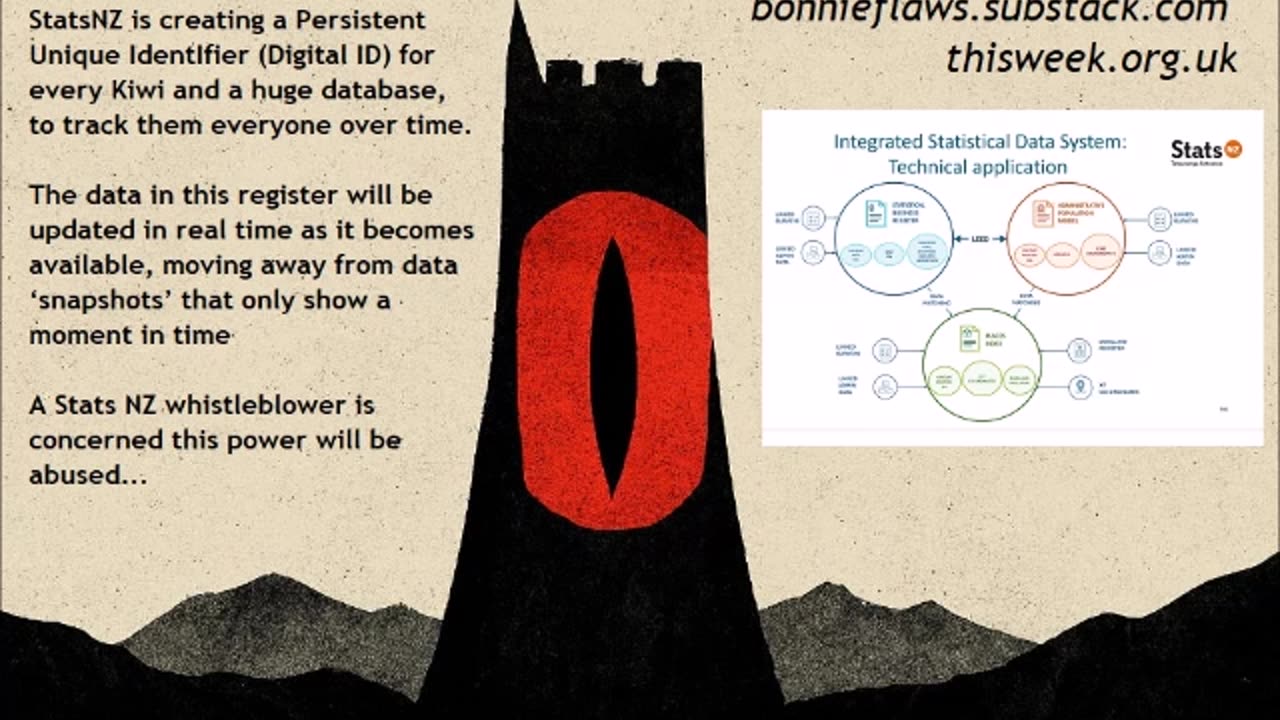Premium Only Content

StatsNZ are secretly plotting a 'Real Time Surveillance System' or 'Census-less Census' Bonnie Flaws
Bonnie Flaws explains the New Zealand government is secretly developing a real-tie database to put every single New Zealander under surveillance
https://bonnieflaws.substack.com/p/one-register-to-rule-them-all-how
StatsNZ They’re secretly calling it The Census-less Census – One Register to Rule them All: what #Stats NZ is planning behind closed doors.
Misuse of personal data at Manurewa Marae is just the tip of the iceberg in what has been revealed as a monster data-centralising project. An Stats NZ insider who spoke to me on condition of anonymity believes that if the public knew more about what the IDI holds about them, they might be nervous about the potential for government overreach. According to the source, getting IDI access does have a lot of controls and requires interviews and confidentiality training to access. But it also has weaknesses such as a lack of auditing for the researchers who might be accessing it. Usually, a research project gets access to only a specific dataset for analysis, but sometimes a researcher might be on multiple projects over the years and accumulate access to multiple datasets, they say. “No one checks to see if they are using their approved datasets for a specific project or not. It is up to the integrity and seniority of the researcher.” While researchers are required to sign NDAs, more than 100 data breaches had already occurred by 2023. I’ve asked Stats NZ for more up to date figures but they were unable to get back to me in time for publication. Also of concern, research from 2019 found that applications to use the IDI for research are reviewed internally by Stats NZ, with no mandatory external peer review or ethical approval across sectors. Furthermore, ethical standards for using IDI data vary across universities, government departments and private research entities. All of Stats NZ data gathering powers rely on social license. But surveys have shown that there is actually low public trust around Stats NZs ability to keep data safe or even that it considers the public’s views in its decision making. However, there may be considerably more reason to question the social license Stats NZ relies on today. Stats NZ is working on a project that will link statistical business, location and population registers into one overarching statistical register. As of yet there is no population register, but they are building it. The Everything Database: person-level tracking in real time, all the time A multi-part Official Information Act request from April 2024 has revealed that since 2022, an initiative called the Statistical Register has been underway with the goal of linking an upgraded version of the IDI with an existing location register (a list of addresses and addressable objects) and a 30-year-old business register (containing information on business profits, sector, age and size) via IRD tax data. Development consultants Allen + Clarke describe it as “unlocking high value”. In sector jargon, this Statistical Register would be the realisation of an ‘Integrated Statistical Data System’. What I have euphemistically called the ‘everything database’, because it is not far short of that. And as we will see, there is the potential to add all kinds of other data streams to this register, such as social media, supermarket spending or telecoms data for example. “The amount that could be controlled when you know someone’s political views and address and workplace and family history might be too much power for one organisation,” the insider says. Here’s the kicker: Once the business and location data are linked to the new IPS, they will have succeeded in creating a central register, with each person represented by a unique ID that can be tracked over time and tell a story about a person’s whole life, and even to track a person’s life events from birth. It’s referred to as a ‘Persistent Unique Identifier’ (PUI) in sector jargon. The end result is the Statistical Register (everything database) plus a permanent digital tag for every person. The eye of Sauron on everyone one of us, all the time, whether we want it or not.
-
 19:12
19:12
Robbi On The Record
3 hours ago $2.32 earnedThe Loneliness Epidemic: AN INVESTIGATION
6.73K33 -
 14:45
14:45
Mrgunsngear
21 hours ago $59.14 earnedFletcher Rifle Works Texas Flood 30 Caliber 3D Printed Titanium Suppressor Test & Review
38.9K12 -
 17:17
17:17
Lady Decade
22 hours ago $2.31 earnedMortal Kombat Legacy Kollection is Causing Outrage
8.83K6 -
 35:51
35:51
Athlete & Artist Show
23 hours ago $5.25 earnedIs Ryan Smith The Best Owner In The NHL?
17.4K -
 22:56
22:56
American Thought Leaders
1 day agoCharles Murray: I Thought Religion Was Irrelevant to Me. I Was Wrong.
13K4 -
 36:22
36:22
Brad Owen Poker
4 hours agoGIGANTIC $17,000+ Pot In BOBBY’S ROOM! TRAPPING Top Pro w/FULL HOUSE!! Big Win! Poker Vlog Ep 326
15.8K -
 3:53
3:53
NAG Daily
21 hours agoRUMBLE RUNDOWN: DREAM HACK SPECIAL W/Greenman Reports
10.5K6 -
 1:28
1:28
Damon Imani
1 day agoThey Laughed at Trump’s Cognitive Test — Damon Made Them REGRET It!
16.9K8 -
 9:14
9:14
Freedom Frontline
23 hours agoAdam Schiff PANICS As Eric Schmitt Exposes His Dirty Lies LIVE
11.3K8 -
 10:32
10:32
GBGunsRumble
1 day agoGBGuns Armory Ep 153 Adler Arms AD-9`
8.43K1